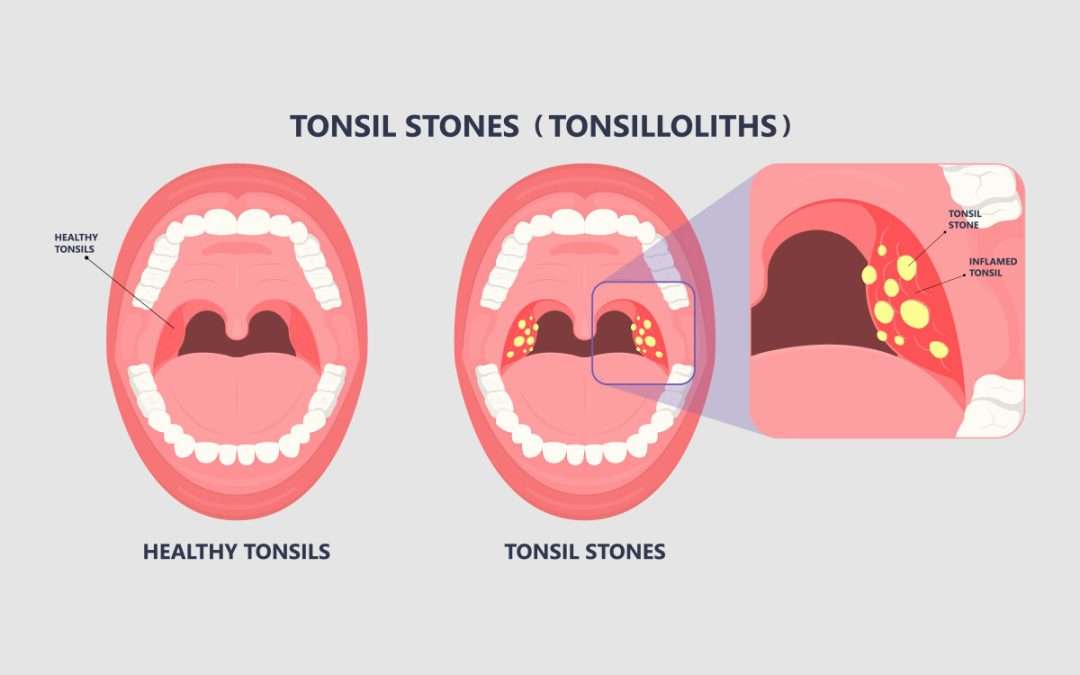You can get stones in your kidneys, your gall bladder, your ears, and apparently also your tonsils. Also known as tonsilloliths, tonsil stones aren’t quite a medical emergency and often can resolve on their own. However, they can occasionally cause some problems, which is unsurprising given that tonsils are not the typical habitat for stones.
What Causes Tonsil Stones?
Tonsil stones form as debris collect in the folds of the tonsils, known as tonsillar crypts. This debris can be made up of food, discarded cells, or bacteria, which then calcifies over time. The accumulation of calcium around the particles of food or whatnot turns the aforementioned whatnot into a hard little pebble on your tonsils – a tonsil stone.
Most tonsil stones are tiny, around the size of a grain of rice, though some can be significantly larger, up to the size of a grape, the equivalent of a tonsil boulder. They tend to be most common in the teenage years because this is when tonsillar crypts are most prominent but can happen to anyone of any age, gender, and ethnicity.
Though anyone can get tonsil stones, they appear to be more common with:
- Large tonsils
- Chronic tonsillitis
- Chronic sinus problems
- Poor dental hygiene
Symptoms of Tonsil Stones
Small tonsil stones sit happily in their crypts without causing a fuss. Meanwhile, larger tonsilloliths can cause:
- Bad breath (halitosis)
- Persistent sore throat
- Difficulty swallowing
- Earache
- Persistent cough
- Swollen tonsils
- An unpleasant taste in the mouth
- The sensation of something stuck in the throat
- Throat infections that are resistant to treatment with antibiotics
Finding a tonsil stone is often a coincidental observation while a dentist or doctor is examining your throat for other reasons. They can also show up on x-rays or other imaging scans.
Rarely do tonsil stones cause any serious problems other than the unfavorable symptoms listed above. However, very large stones may interfere with breathing or swallowing.
Tonsil Stone Treatment
In most cases, tonsil stones will dislodge on their own over time and you can ignore them completely. If they are causing you some distress (or distress to those within breathing distance of your halitosis), you can consider the simple home remedy of gargling with salt water. Vigorous gargling can help the stones dislodge from the tonsils and also neutralize some of that bad breath.
It’s important to note that home remedies for tonsil stones do not include trying to pick them out yourself. Whether you’re using a jet of water, finger, toothpick, toothbrush, or any other tool to try and flick out those stones, this DIY treatment is fraught with danger such as bleeding, infection, or soft tissue damage.
It is uncommon to need the attention of an ENT (ear, nose, throat) doctor to manage tonsil stones. However, very large stones may need some surgical help in going away. A treatment known as cryptolysis works by smoothing out the tonsillar crypts that trap deposits. Alternatively, your doctor may recommend a tonsillectomy to remove the tonsils. This is typically only recommended for severe, chronic cases and where all other treatment options fail.
How to Prevent Tonsil Stones
Some people may be prone to developing tonsil stones while others only ever have one. Whether you get tonsil stones regularly or are yet to experience your first, there are some steps you can take to reduce your risk of developing tonsil stones.
Practice good oral hygiene.
Brushing, flossing, and all those good things your dentist taught you can help to prevent the development of tonsil stones by reducing the amount of trapped food and bacteria around your mouth. In case you need reminding – the recommendation is to brush your teeth twice a day and floss regularly, too. It’s also a sensible idea to give your tongue a good scrub to prevent the build-up of bacteria on its surface.
Gargle with salt water.
Though not quite the digestive or after-dinner mint you may have had in mind, gargling with salt water after a meal helps to clean the mouth and neutralize bad breath. Gargling with a mouthwash can also be beneficial (and tastes better), but avoid those with alcohol, which can cause irritation and swelling around the tonsil stones.
Quit smoking.
Smoking induces inflammation in the mouth or throat as well as irritates the tonsils. This exacerbates the tonsillar crypts, creating more hiding holes for tonsil stones.
Drink lots of water.
Staying hydrated is a good idea in general but when it comes to tonsil stones, the reasoning is that it promotes a healthy mouth by supporting saliva production and limiting the accumulation of debris.
Though tonsil stones and their symptoms are not pleasant, they don’t present any significant risk to your health. That being said, it is reasonable to take steps to avoid developing them, and good dental hygiene is something worth practicing regardless. If you do have large tonsil stones bothering you, see your family physician about referral to an ENT specialist.

